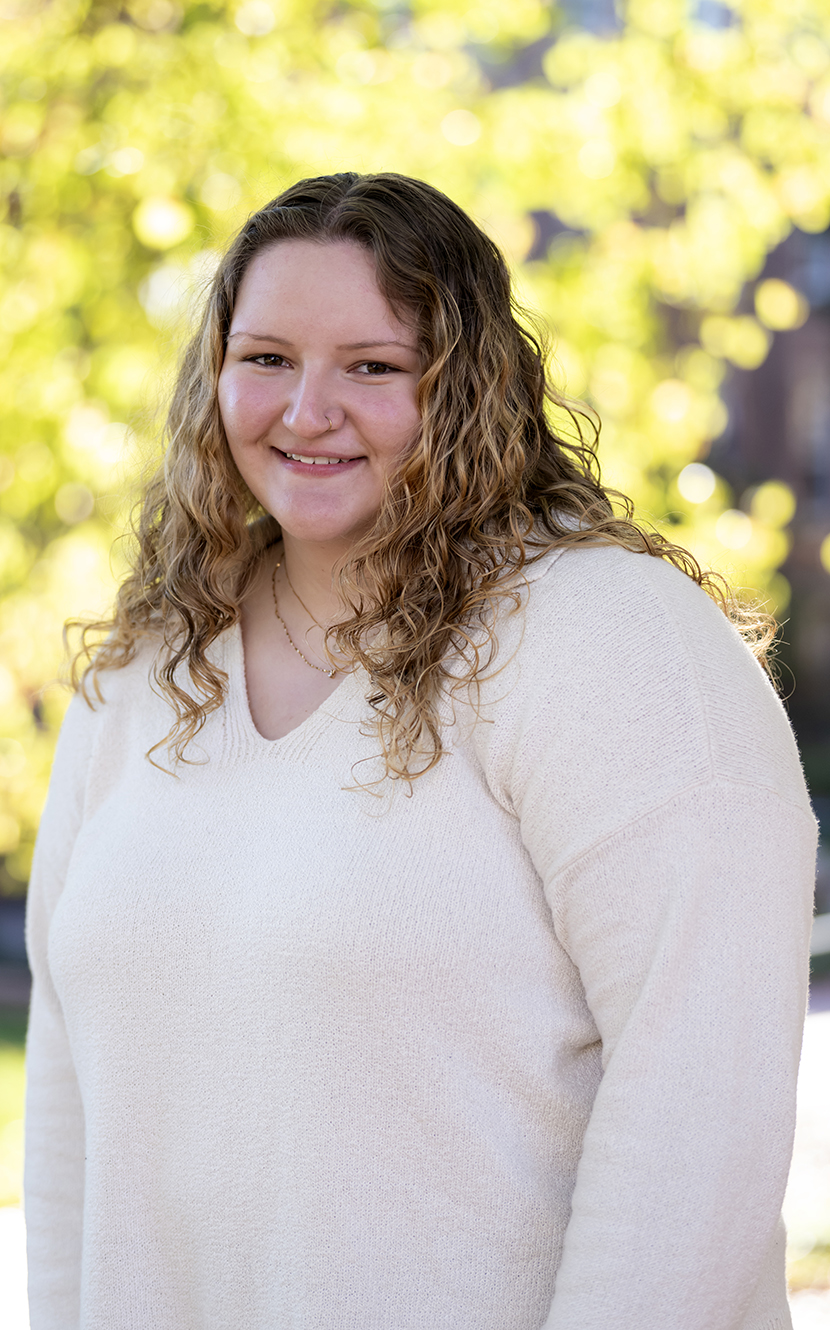
MAJORS AND MINORS
- English Major and Education Studies Minor
- Secondary Teacher Certification Program
EXPERIENTIAL LEARNING
- Busload of Books Research Team
- Talbot Mentors; Roy Ans Fellowship in Jewish-American Studies
CAMPUS ACTIVITIES
- Softball Team; Student Athlete Advising Committee
- Best Buddies
- “Within the education department, I have been able to work closely with all four of the professors. It has been really wonderful. The faculty-to-student ratio was part of the reason I ended up coming here, to have that personal relationship with your professors. I get to go have a conversation with this person who is personally invested in my success.”

Education to Help Marginalized Populations
Emmie Meeks '26
Broomfield, ColoradoMAJORS AND MINORS
- English Major and Education Studies Minor
- Secondary Teacher Certification Program
EXPERIENTIAL LEARNING
- Talbot Mentors; Roy Ans Fellowship in Jewish-American Studies
CAMPUS ACTIVITIES
- Softball Team; Student Athlete Advising Committee
- Best Buddies
- “Within the education department, I have been able to work closely with all four of the professors. It has been really wonderful. The faculty-to-student ratio was part of the reason I ended up coming here, to have that personal relationship with your professors. I get to go have a conversation with this person who is personally invested in my success.”
She realized that education was the way she would change her life, and she had adults
supporting her as she got involved in high school activities and began looking for
colleges. Meeks wanted to major in English, and the Rose O'Neill Literary House was a factor in her decision to come to Washington College. (So was the softball
team; Coach Sally Snover's trip to a recruiting tournament in Colorado was actually
how Meeks learned about Washington.)
But Meeks never lost sight of the importance of education and the people who had helped her, so she came into the College already thinking she would like to be a high school English teacher. Washington's academic program has provided her with a perfect way to achieve her goals, allowing her to major in English, minor in education studies, and gain a secondary teacher certification, all while participating in extracurricular and co-curricular activities.
“In a lot of my education classes, I have focused on marginalized groups and how external factors are affecting classroom performance. I've done projects on twice-exceptional students—students with learning differences or autism and being highly gifted and talented and living in poverty—and how that is affecting other things,” Meeks said of her experience through the minor and certification program. “I grew up in an area of Denver that was extremely low income, and a lot of these groups were very present in the schools that I was attending. I saw how good teachers were able to help overcome those things. So I have always had this interest of ‘how can I help bridge some of these achievement gaps?'”
In addition to her coursework, Meeks contributes to research aiming to provide some answers to that question and tutors high school students at an Eastern Shore non-profit organization, both opportunities made possible through the College.
Meeks is serving as a student intern on the Busload of Books Research Project, a collaboration between the Department of Education and author and illustrator Matthew Swanson and Robbi Behr, who traversed the country in their Busload of Books, visiting at least one Title I school in every state to speak to students, lead creativity exercises with them, and give out books. Meeks and faculty from the education and sociology departments are researching the impacts of those visits, and initial results are backing up anecdotal accounts of educators, students, and authors that say the visits inspire students and teachers.
While she helps put numbers to the impact of informal education by studying the Busload of Books project, Meeks helps individual students directly by working at Talbot Mentors in Easton, Maryland, twice a week. In a building right next to Easton High School, the program offers rooms for students to use after school and provide tutors in a variety of subjects for a variety of goals.
“There are these smart, high achieving kids that just need a little bit of extra help for whatever reason, whatever subject. Our job is to just be there and be available for whatever they need,” Meeks said. “Talbot Mentors just try to create a safe space in the community for these students to be able to dedicate time to their academics. A lot of them have jobs and are helping to support their families."
Meeks said that because she was able to start her experiential learning experiences earlier in her college career, knowing she wanted to be a teacher from the start, she has been able to try out more specific ways of combining her interests in literature and education to benefit different groups. But whether she is helping with data analysis on Busload of Books or conducting her own research into Phillis Wheatley or Jewish literature taught in high schools, Meeks sees a common thread.
“I have this particular interest in how marginalized groups are being educated and working to close the gaps. How can I expand my own knowledge of how to teach different kinds of people? How can I give back to the community?”
— Mark Jolly-Van Bodegraven